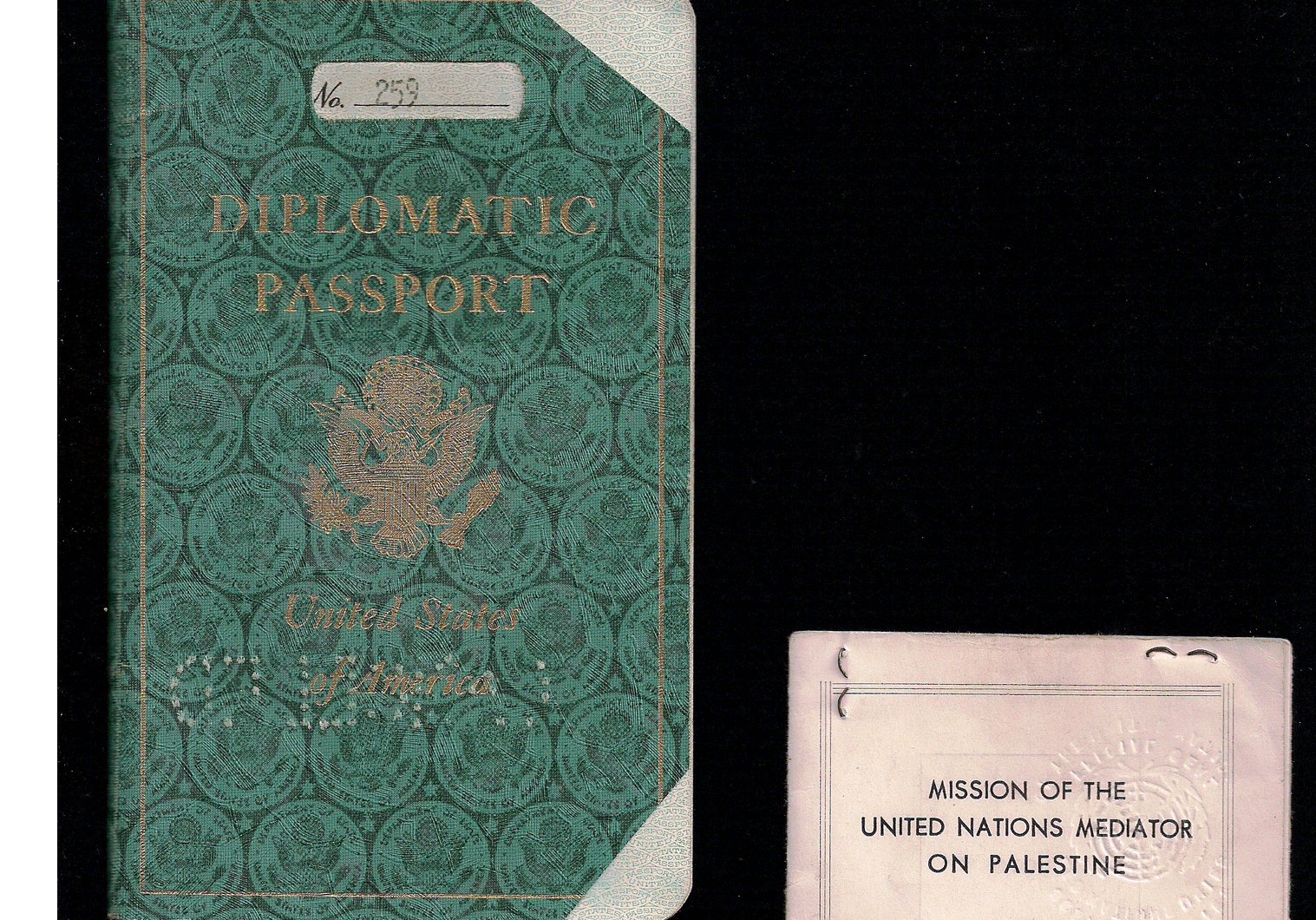Historical 1949 US Diplomatic passport
Arab-Israeli war & establishing of borders.
The founding of a state is always an exciting event, full of historical significance, deep with emotion as well. For the people who live in their newly founded country, the path and time it took them to reaching this goal was not always smooth and simple, and from a historical point of view, the creation of a country normally resulted in war, violence and bloodshed; with all sides committing atrocities, sadly, something unavoidable in ANY conflict that erupts.
On November 29th 1947 the United Nations decided that a Jewish & Muslim state should be founded, two new states, one for each side, one next to the other. While the Jews welcomed this proclamation, the Muslim residents of then British Colonial Mandate did not. Civil war broke out only to worsen following the establishing of the State of Israel on May 14th 1948, when the Arab states launched a war on the Jewish population, in the goal of preventing any such possibility, and to finish what “Hitler did not”, as their propaganda claimed: Five Arab counties participated in this event, supporting the Muslim Palestinian people and urging them to be patient, leave their homes, and they shall all return within a few weeks (others were also driven away by the advancing Jewish army and scores fled in fear)…as we know today, those few weeks became 67 years, and such promises did not fulfil themselves into reality. Reality has its own agenda and way of evolving…thousands of Palestinians were placed into refugee camps, deprived of any development, with their new hosts making sure that they do not integrate into the neighboring Arab countries, making sure the festering wounds continue so for years to come. Today, as we all know, these refugee camps are scattered throughout the Middle East, and those located in Syria today are under attack by fellow Muslim brothers…Daesh & Isis.
United Nations Partition Plan for Palestine
The creation of the State of Israel in 1948 did not finish in a simple proclamation back then; the new country was at war from within and from outside, with its borders not clear and not marked yet. The 1947 UN proclamation was void, “reality in the field” was creating facts for the future. Advancing Israeli fighters where changing the course of events, but these events at some point, had to cease and stability had to come in. International patience was running out and the community abroad wanted the cessation of hostiles, to solve the issues of all sides in this conflict. Thus, the UN established various organizations and bodies that tried to address the issue. Resolutions where passed.
List of the UN resolutions concerning Israel and Palestine
United Nations Palestine Commission
United Nations Special Committee on Palestine
United Nations Conciliation Commission
As truce and cessation of hostiles were needed, international observers began to arrive in the region to mediate a cease fire and also the establishing of borders between the fighting parties. One such member, from the United Nations Mediation for Palestine and also assigned by the Security Council Truce Commission for Palestine was United States captain Harry Llewellyn Bixby. Here we find images of his passport. Important evidence to those historical days.
The passport, No.259, was issued at Washington on February 18th 1949, hand signed personally by then Secretary of State Dean Acheson who was in office from 1949 to 1953, appointed by Harry S. Truman.
Great importance was attached to his post as US mediator to Palestine that his passport was not limited to a specific period of time and was valid to travel in any country on official business, as marked on page 5. He arrived in Israel on February 26th via Haifa, after transiting through Holland a day before. The passport is extra special and unique: even until today no passport bearing both Israeli & Arab state border markings can be easily found, with the latter refusing to issue such visa or entry permit should the holder have applied, previously, for an Israeli visa or bare inside the markings of having visited already the latter. Already in the late 1940’s Arab visas applied into foreign passports clearly state that the “visa is considered void if the bearer obtained an Israeli visa there after” (added sample examples). Next to the Israeli border markings we find the entry & exit stamps for Syria as well. Israel’s first border to be marked was the Israeli-Lebanese border, negotiations starting in January 1949 and the marking ending in 1951. The hardest negotiations were with the Syrian side, which also had a change of leadership in 1949.
The passport came together with the holder’s special appointment identity document & pass permit issued by the United Nations as the holder was an official member of the “Mission of the United Nations Mediator on Palestine”. ID No. 1291, issued at Haifa on February 26th (day of his arrival) and personally singed by then chief ‘United Nations Mediator on Palestine’ Ralph Bunche, who took over this post after the assassination of his predecessor Swedish count Folke Bernadotte in September 1948 by extreme Jewish underground assailants.
Finding a solution to past grievances is not simple; we are still plagued with this long conflict today with both sides, Israeli & Palestinian, unable to reach an understanding on various topics, such as a capital, security, refugees and borders.
Thank you for reading “Our Passports”.










